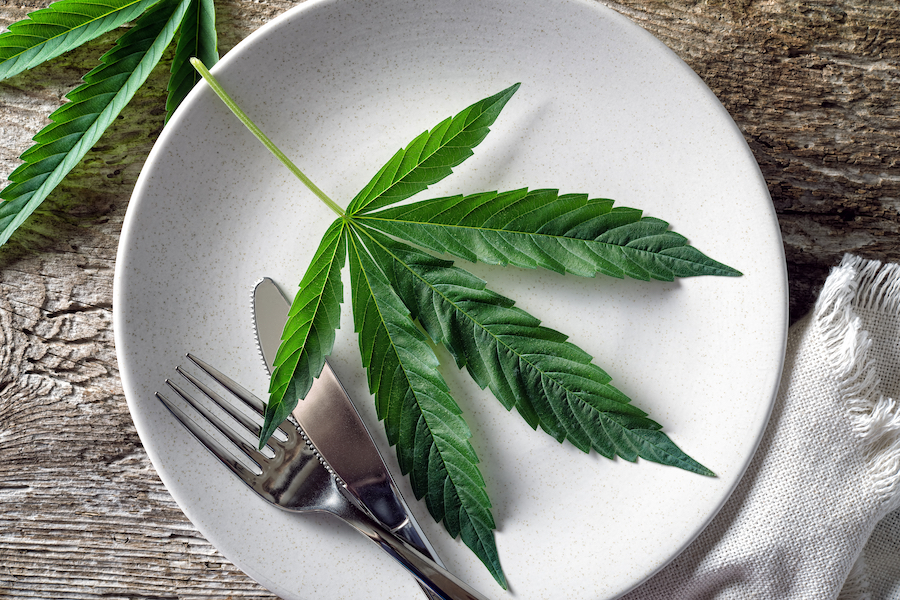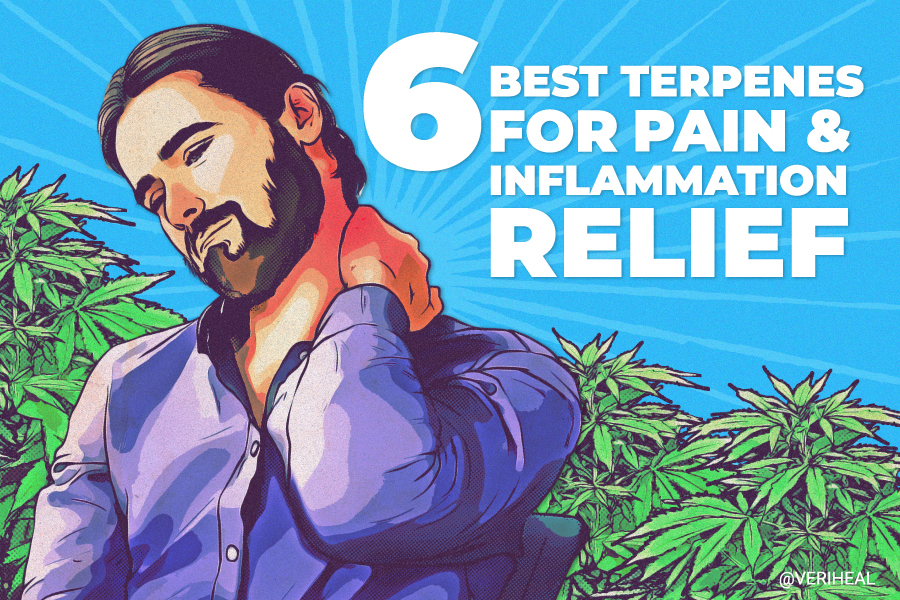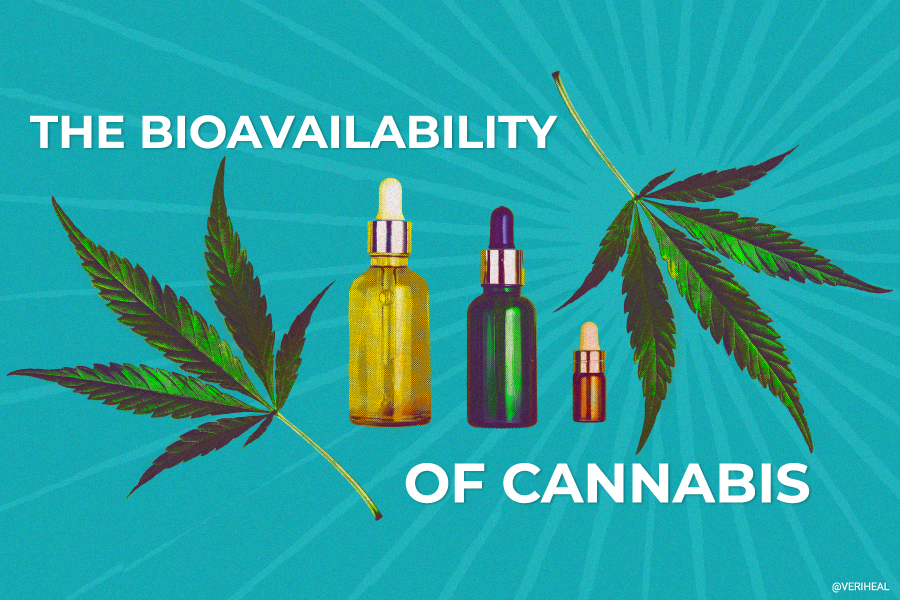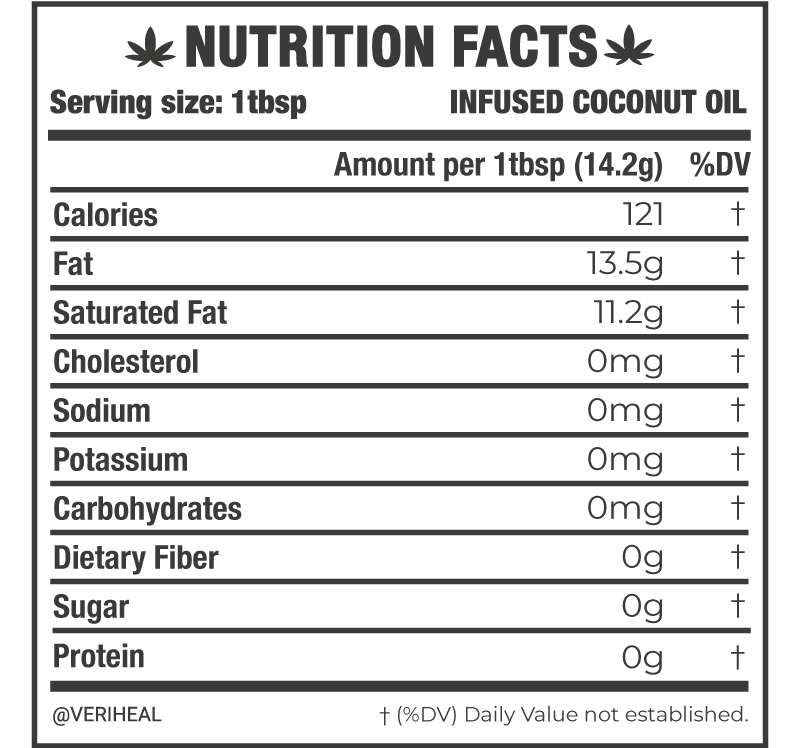Cannabis for Chronic Obstructive Pulmonary Disease (COPD)

- COPD Risks, Complications and Symptoms
- Treatments for COPD
- The ECS and COPD
- The Effects of THC and CBD on COPD
- What Preparations of Cannabis are Recommended for COPD
COPD is a class of chronic lung conditions when the lung airways and air sacs do not inflate and deflate appropriately due to inflammation, less elasticity, and mucus that destroys or obstructs the airflow, making it hard to breathe (23).
Emphysema and chronic bronchitis are the two most common forms of COPD, causing weight loss, weakness, and swelling. COPD News Today reports aside from avoiding inhaling medical cannabis, treating the condition with anti-inflammatory and pain-relieving properties of the plant could be positive (9).
Smoking should be avoided because according to research there are associations between heavy cannabis smoking and developing chronic bronchitis and COPD (10). Vaping concentrates may also cause airway irritation and other potential health risks like lipoid pneumonia. However, there is no statistical link between inhalation and lung cancer. When taken by a non-inhalational route, cannabis may reduce inflammation, relieve insomnia, support the immune system, and reduce mucus, according to the news source.
COPD Risks, Complications and Symptoms
The Centers for Disease Control and Prevention (CDC) breaks down COPD statistics, reporting in 2020 that 5% of the adult population have COPD (6). In 2020, there were over 140,000 deaths due to COPD.
The four most significant risks to contracting COPD are smoking, including tobacco and cannabis; asthma; occupational hazards including long-term exposure to dust, toxic chemicals, and fumes; age, and genetics like alpha-1-antitrypsin deficiency that causes frequent, heavy-mucus coughing, wheezing, shortness of breath, and chest tightening.
According to Mayo Clinic COPD can cause many complications, including respiratory infections, heart problems, lung cancer, high blood pressure in lung arteries, and depression (14).
Symptoms of COPD
According to the National Heart, Lung, and Blood Institute, common symptoms of COPD include:
- An ongoing cough or a cough that produces a lot of mucus, sometimes called smoker’s cough. This is often the first symptom of COPD.
- Shortness of breath, especially with physical activity. You may feel like breathing takes more effort or that you are gasping for air.
- Wheezing or a whistling or squeaky sound when you breathe
- Chest tightness or heaviness (22)
Treatments for COPD
When treating COPD your plan may include medication, surgery, or both. Several treatments for COPD range from steroids, inhalers, pulmonary rehabilitation, supplemental oxygen, and surgery depending on the severity and exacerbation status.
Your treatment plan may include:
- Bronchodilators
- Corticosteroids
- Combination inhalers
- Antibiotics
- Roflumilast (Daliresp)
- Flu and pneumonia vaccines
- Pulmonary rehabilitation
- Oxygen therapy
- Bullectomy
- Lung volume reduction surgery
- Lung transplant
The ECS and COPD
The endocannabinoid system (ECS) is a complex cell signaling system that can be found throughout the body and the central nervous system (CNS). It is responsible for maintaining homeostasis in the body through regulating several key bodily functions such as memory, sleep, fertility, memory, pain perception, and more.
Cannabinoids such as delta-9 tetrahydrocannabinol (THC) and cannabidiol (CBD) are able to interact with the ECS. Several studies suggest that modulating the ECS may help provide symptomatic relief to patients with COPD. It could potentially provide symptom relief without severe adverse side effects.
The Effects of THC and CBD on COPD
Medical News Today cited a journal, Nature 2016, which summarized the results of 19 studies on COPD and cannabis and forced vital capacity (FVC), which is the force and speed of exhaling after inhaling. With several trial components, including dose-related exposure to medical cannabis, it was demonstrated that when consumed, medical cannabis increases the FVC, whereas COPD decreases FVC (19).
However, it is important to note that these bronchodilation effects are only short-term. The review study also notes that “chronic cannabis users have an increased incidence of respiratory symptoms such as chronic cough, sputum production, dyspnoea, hoarse voice, and chest tightness. As marijuana smoke contains many of the same compounds as—and shares similar properties with—cigarette smoke, respiratory symptoms would be expected.” Other studies generally agree that long-term cannabis smoking is still modestly associated with an increase in developing chronic bronchitis and COPD (10). Inhalational methods should be avoided for optimal lung health especially in people already with COPD, but patients may use medical cannabis in other ways.
Medical News Today reports medical cannabis alleviated COPD symptoms due to its antimicrobial properties and ability to act as an expectorant, reduce mucus, relieve pain and bolster better sleep patterns. This means there could be temporary, symptomatic relief from using THC and CBD. The institute details the alternative methods to smoke medical cannabis, which could put COPD sufferers at risk for further airway and air sac obstruction. Consuming THC and CBD as sublingual oil, tinctures or edibles are some of the most popular, non-inhalational ways to administer medical cannabis (15).
“Though the topic is a controversial one, as time moves forward, the use of medical marijuana has generally become more widely accepted,” reports the Lung Institute.
Medical cannabis has been demonstrated to alleviate inflammation and chronic pain caused by various conditions, as well as relieve pain. COPD is just one of almost 60 listed conditions medical cannabis could continue to help treat, and that list keeps getting longer.
As far back as 1976 THC in particular has been studied and found to be an effective bronchodilator (24). This means that cannabis has been found effective in widening the bronchi—the large air passages that lead from the trachea (windpipe) to the lungs. THC and CBD are both well-known anti-inflammatory agents (16).
One study that explored the trends in outcomes of cannabis use among patients with COPD that were hospitalized found that “Among hospitalized patients with a diagnosis of COPD, cannabis users had statistically significant lower odds of in-hospital mortality and pneumonia compared to non-cannabis users. The association between cannabis use and these favorable outcomes deserves further study to understand the interaction between cannabis use and COPD (8).” It is encouraging that cannabis users with COPD were associated with a lower risk of death and pneumonia. Still, there is still much to be understood about the relationship between cannabis use and COPD.
Another study found that cannabis oil containing diluted CBD, CBDA, and THC extract, “may affect expression of specific airway epithelial cell genes that could modulate pro-inflammatory or Th1 processes in COPD (12).” Further research will have to elucidate which specific doses and ratios might be useful for COPD patients’ symptomatic relief. Additionally, studies need to determine the short-term bronchodilator effects of THC and elucidate the possible detriments of smoking or vaping cannabis and other long-term effects including the development of bronchitis and COPD.
COPD, Medical Cannabis, and Sleep Disorders
The prevalence of sleep disorders among COPD patients has been long recognized. The increased rates of COPD patients that also have conditions such as insomnia, restless leg syndrome, sleep apnea, and hypoxemia, are well documented (5). In order to improve COPD patients’ quality of life it is essential to treat comorbid conditions such as sleep disorders.
According to a systematic review of cannabinoids and sleep published in 2017, cannabidiol (CBD)—the nonpsychoactive cannabinoid found in the Cannabis sativa L. plant—may have therapeutic potential for insomnia patients. The review also found that delta-9 tetrahydrocannabinol (THC) may increase sleep latency (e.g., how fast an individual falls asleep), but may impair sleep quality long term (2).
Unfortunately, there is still mixed and inconclusive data to support the use of cannabinoids for obstructive sleep apnea (OSA). COPD patients with OSA should adhere to their provider’s recommendations in regards to sleep studies and airway pressure support devices like CPAPs to prevent further cardiopulmonary complications and exacerbations (18).
COPD, Medical Cannabis, Inflammation and Immune Support
COPD is ultimately an inflammatory disease of the airways and is associated with lung-specific and systemic immune dysfunction. Inflammation is a biological response of the immune system that can be triggered by a variety of factors such as pathogens or toxic compounds. There are many similar compounds present both in tobacco smoke and cannabis smoke that may contribute to the development of COPD (10).
According to an Oncotarget article in the National Library of Medicine, “These factors may induce acute and/or chronic inflammatory responses in the heart, pancreas, liver, kidney, lung, brain, intestinal tract and reproductive system, potentially leading to tissue damage or disease (7).”
When the lungs of COPD patients are chronically inflamed it contributes to further lung damage and disrupts both the innate and adaptive immune responses (3).
Endocannabinoids in the body’s ECS have an important role in the immune response (17). Research has shown that, “manipulation of endocannabinoids and/or use of exogenous cannabinoids in vivo can constitute a potent treatment modality against inflammatory disorders (16).”
Since COPD is characterized by chronic inflammation and immune dysfunction, medical cannabis may provide symptom relief through its ability to interact with the body’s ECS and regulate the immune system and inflammation. Further randomized, controlled clinical research into the COPD population specifically is needed in order to fully understand medical cannabis’ therapeutic potential as an immunosupportive and anti-inflammatory drug.
COPD, Medical Cannabis, and Depression
Depression is a common comorbid condition seen in patients with COPD. According to one analysis of this phenomenon, “around 40% are affected by severe depressive symptoms or clinical depression (20).” It is important to address co-occurring conditions such as depression when treating patients with COPD.
There is some evidence that shows medical cannabis may be effective in treating depression and other mood disorders. Though research exploring the potential anxiolytic (anxiety-reducing) and antidepressant effects of cannabis is still in its infancy, some preliminary research suggests it could be effective in providing relief to patients with depression. CBD, on the other hand, has stronger evidence to support its claims as an anti-anxiety agent at least in the short term (4).
According to one study that surveyed published in 2021, “Medicinal cannabis use was associated with lower self-reported depression, but not anxiety, at baseline. Medicinal cannabis users also reported superior sleep, quality of life, and less pain on average (13).”
What Preparations of Cannabis are Recommended for COPD?
When it comes to drug administration and medical cannabis it’s important to consider different consumption methods. It is not advisable to smoke or vape medical marijuana or any substance when treating lung diseases such as COPD (21).
A randomized controlled trial conducted in 2018 that explored the effects of vaporizing cannabis and COPD patients found that “single-dose inhalation of vaporized cannabis had no clinically meaningful positive or negative effect on airway function, exertional breathlessness, and exercise endurance in adults with advanced COPD (1).”
One study that investigated cannabis and lung health concluded that “when used, cannabis should be used safely without causing respiratory harm and should not be used combusted or combined with tobacco in a cigarette (11).” Oral preparations of cannabis are safest for patients with COPD such as edibles, pill or capsule form, or sublingual forms of cannabis. It is critical that COPD patients avoid serious exacerbations therefore avoiding inhalational routes is paramount.
Talk to Your Doctor About Medical Cannabis
Talk to your doctor about medical cannabis and if it could be a useful addition to your treatment plan. A cannabis coach can help you determine the method of consumption that is best for your condition and make appropriate product recommendations that you can find in your local dispensary.
Note: The content on this page is for informational purposes only and is not intended to be professional medical advice. Do not attempt to self-diagnose or prescribe treatment based on the information provided. Always consult a physician before making any decision on the treatment of a medical condition.
1. Abdallah, S. J., Smith, B. M., Ware, M. A., Moore, M., Li, P. Z., Bourbeau, J., & Jensen, D. (2018). Effect of vaporized cannabis on exertional breathlessness and exercise endurance in advanced chronic obstructive pulmonary disease. A randomized controlled trial. Annals of the American Thoracic Society, 15(10), 1146–1158. https://pubmed.ncbi.nlm.nih.gov/30049223/
2. Babson, K. A., Sottile, J., & Morabito, D. (2017). Cannabis, cannabinoids, and sleep: A review of the literature. Current Psychiatry Reports, 19(4). https://pubmed.ncbi.nlm.nih.gov/28349316/
3. Bhat, T. A., Panzica, L., Kalathil, S. G., & Thanavala, Y. (2015). Immune dysfunction in patients with chronic obstructive pulmonary disease. Annals of the American Thoracic Society, 12(Supplement 2). https://www.ncbi.nlm.nih.gov/pmc/articles/PMC4722840/
4. Blessing, E. M., Steenkamp, M. M., Manzanares, J., & Marmar, C. R. (2015). Cannabidiol as a potential treatment for anxiety disorders. Neurotherapeutics, 12(4), 825–836. https://www.ncbi.nlm.nih.gov/pmc/articles/PMC4604171/#:~:text=We%20found%20that%20existing%20preclinical,have%20investigated%20chronic%20CBD%20dosing
5. Budhiraja, R., Siddiqi, T. A., & Quan, S. F. (2015). Sleep disorders in chronic obstructive pulmonary disease: Etiology, impact, and Management. Journal of Clinical Sleep Medicine, 11(03), 259–270. https://jcsm.aasm.org/doi/full/10.5664/jcsm.4540
6. Centers for Disease Control and Prevention. (2022, February 1). FASTSTATS – chronic lower respiratory disease. Centers for Disease Control and Prevention. Retrieved August 23, 2022, from https://www.cdc.gov/nchs/fastats/copd.htm
7. Chen, L., Deng, H., Cui, H., Fang, J., Zuo, Z., Deng, J., Li, Y., Wang, X., & Zhao, L. (2017). Inflammatory responses and inflammation-associated diseases in organs. Oncotarget, 9(6), 7204–7218. https://www.ncbi.nlm.nih.gov/pmc/articles/PMC5805548/
8. Gunasekaran, K., Voruganti, D. C., Singh Rahi, M., Elango, K., Ramalingam, S., Geeti, A., & Kwon, J. (2021). Trends in prevalence and outcomes of cannabis use among chronic obstructive pulmonary disease hospitalizations: A nationwide population-based study 2005–2014. Cannabis and Cannabinoid Research, 6(4), 340–348. https://pubmed.ncbi.nlm.nih.gov/33998884/#:~:text=The%20majority%20of%20COPD%20hospitalizations,%3D0.0059
9. Henderson, W. (2017, June 12). Could cannabis benefit COPD patients? COPD News Today. Retrieved August 23, 2022, from https://copdnewstoday.com/social-clips/cannabis-benefit-copd-patients/
10. Jett, J., Stone, E., Warren, G., & Cummings, K. M. (2018). Cannabis use, lung cancer, and related issues. Journal of Thoracic Oncology, 13(4), 480–487. https://www.jto.org/article/S1556-0864(18)30038-8/fulltext
11. Kaplan, A. G. (2021). Cannabis and lung health: Does the bad outweigh the good? Pulmonary Therapy, 7(2), 395–408. https://www.ncbi.nlm.nih.gov/pmc/articles/PMC8589923/
12. Mamber, S. W., Gurel, V., Lins, J., Ferri, F., Beseme, S., & McMichael, J. (2020). Effects of cannabis oil extract on immune response gene expression in human small airway epithelial cells (hsaepc): Implications for chronic obstructive pulmonary disease (COPD). Journal of Cannabis Research, 2(1). https://jcannabisresearch.biomedcentral.com/articles/10.1186/s42238-019-0014-9
13. Martin, E. L., Strickland, J. C., Schlienz, N. J., Munson, J., Jackson, H., Bonn-Miller, M. O., & Vandrey, R. (2021). Antidepressant and anxiolytic effects of medicinal cannabis use in an observational trial. Frontiers in Psychiatry, 12. https://pubmed.ncbi.nlm.nih.gov/34566726/#:~:text=Results%3A%20Medicinal%20cannabis%20use%20was,and%20less%20pain%20on%20average
14. Mayo Foundation for Medical Education and Research. (2020, April 15). COPD. Mayo Clinic. Retrieved August 23, 2022, from https://www.mayoclinic.org/diseases-conditions/copd/symptoms-causes/syc-20353679#:~:text=COPD%20can%20cause%20many%20complications,further%20damage%20to%20lung%20tissue
15. MediLexicon International. (n.d.). Can marijuana cause COPD and can it treat it? Medical News Today. Retrieved August 23, 2022, from https://www.medicalnewstoday.com/articles/323273
16. Nagarkatti, P., Pandey, R., Rieder, S. A., Hegde, V. L., & Nagarkatti, M. (2009). Cannabinoids as novel anti-inflammatory drugs. Future Medicinal Chemistry, 1(7), 1333–1349. https://www.ncbi.nlm.nih.gov/pmc/articles/PMC2828614/
17. Pandey, R., Mousawy, K., Nagarkatti, M., & Nagarkatti, P. (2009). Endocannabinoids and immune regulation☆. Pharmacological Research, 60(2), 85–92. https://www.ncbi.nlm.nih.gov/pmc/articles/PMC3044336/#:~:text=Endocannabinoids%20have%20important%20effects%20on,migration%20%5B44%2C45%5D
18. Ramar, K., Rosen, I. M., Kirsch, D. B., Chervin, R. D., Carden, K. A., Aurora, R. N., Kristo, D. A., Malhotra, R. K., Martin, J. L., Olson, E. J., Rosen, C. L., & Rowley, J. A. (2018). Medical cannabis and the treatment of obstructive sleep apnea: An American Academy of Sleep Medicine Position statement. Journal of Clinical Sleep Medicine, 14(04), 679–681. https://www.ncbi.nlm.nih.gov/pmc/articles/PMC5886446/
19. Ribeiro, L. I. G., & Ind, P. W. (2016). Effect of cannabis smoking on lung function and respiratory symptoms: A structured literature review. Npj Primary Care Respiratory Medicine, 26(1). https://www.nature.com/articles/npjpcrm201671
20. Stage, K. B., Middelboe, T., Stage, T. B., & Sørensen, C. H. (2006). Depression in COPD ? management and quality of life considerations. International Journal of COPD, 1(3), 315–320. https://www.ncbi.nlm.nih.gov/pmc/articles/PMC2707161/
21. Tan, W. C., Lo, C., Jong, A., Xing, L., FitzGerald, M. J., Vollmer, W. M., Buist, S. A., & Sin, D. D. (2009). Marijuana and chronic obstructive lung disease: A population-based study. Canadian Medical Association Journal, 180(8), 814–820. https://www.ncbi.nlm.nih.gov/pmc/articles/PMC2665947/
22. U.S. Department of Health and Human Services. (n.d.). COPD – symptoms. National Heart Lung and Blood Institute. Retrieved August 23, 2022, from https://www.nhlbi.nih.gov/health/copd/symptoms
23. U.S. National Library of Medicine. (n.d.). COPD | chronic obstructive pulmonary disease. MedlinePlus. Retrieved August 23, 2022, from https://medlineplus.gov/copd.html
24. Williams, S. J., Hartley, J. P., & Graham, J. D. (1976). Bronchodilator effect of delta1-tetrahydrocannabinol administered by aerosol of asthmatic patients. Thorax, 31(6), 720–723. https://www.ncbi.nlm.nih.gov/pmc/articles/PMC470501/

















